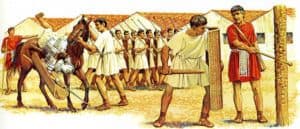This is the eve before I head out on one of the most challenging road trips in recent memory. Composed of eight cities in about four weeks with only a few hours in Austin to repack, it is a testament to the value of our ideas.
Four of the projects are training sessions where we get to teach specific strategies and forge a link to the success found in their direct application. Companies that invest in their people, that look to take advantage of learning new ideas, give themselves a tremendous market advantage. I know that training budgets are the first thing that gets slashed when companies start to pull in their heads, turtle style, when the business climate toughens. It’s the exact wrong thing to do. When times get tough, that’s when training becomes critical. It is an ancient strategy.
In the early days of the Roman Empire they really didn’t have an army. They would conscript farmers and call them into service. Not exactly a martial strategy. In 90 BC the Gaul’s came a callin’ and gave the Romans a good thumping. They pillaged Rome and its surrounding villages for over six months. In fact, the Romans dug deep into their coffers and paid the Gaul’s to leave. It was a good lesson. Training was about to become the Roman advantage.
For the next century Rome became the Mecca of military training. They began a process of perfecting their Legions. No more farmers, Rome began training a professional army. They built a military machine.
They trained in the use of all kinds of weapons. They worked hard on stamina with long marches and runs. They created strategies and taught them to every single soldier. They had fierce discipline creating a sense of accountability so that every soldier was accountable to the soldiers on their right or left.
Rome went from the plaything of the Gaul’s to the Roman Empire.
It’s a great example of the value of training:
- They trained every soldier. Every single one.
- They knew what the basics were weapons, stamina, and strategy. They built their curriculum around three key pieces.
- They had their generals partake in the training to create a sense of connection.
- They held everyone accountable for the application of what they learned.
Trainin g often seems like a luxury and in almost any form, it ain’t cheap, but when it becomes a cultural pillar, a strategy as necessary as accounting, you get The Ritz-Carlton , Apple, British Airways and GE.
g often seems like a luxury and in almost any form, it ain’t cheap, but when it becomes a cultural pillar, a strategy as necessary as accounting, you get The Ritz-Carlton , Apple, British Airways and GE.
Knowledge and skills are expanding qualities and it’s incumbent on companies to be the creator of the opportunities that will make their people the most valuable asset in the company



Leave a Reply